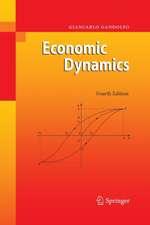Evolutionary Foundations of Economic Science: How Can Scientists Study Evolving Economic Doctrines from the Last Centuries?: Evolutionary Economics and Social Complexity Science, cartea 1
Autor Yuji Arukaen Limba Engleză Hardback – 14 oct 2014
| Toate formatele și edițiile | Preț | Express |
|---|---|---|
| Paperback (1) | 637.59 lei 6-8 săpt. | |
| Springer – 23 aug 2016 | 637.59 lei 6-8 săpt. | |
| Hardback (1) | 643.84 lei 6-8 săpt. | |
| Springer – 14 oct 2014 | 643.84 lei 6-8 săpt. |
Din seria Evolutionary Economics and Social Complexity Science
- 18%
 Preț: 792.34 lei
Preț: 792.34 lei - 18%
 Preț: 723.21 lei
Preț: 723.21 lei - 18%
 Preț: 742.61 lei
Preț: 742.61 lei - 24%
 Preț: 634.34 lei
Preț: 634.34 lei - 15%
 Preț: 639.08 lei
Preț: 639.08 lei - 18%
 Preț: 730.16 lei
Preț: 730.16 lei - 15%
 Preț: 706.48 lei
Preț: 706.48 lei - 15%
 Preț: 583.61 lei
Preț: 583.61 lei - 18%
 Preț: 784.30 lei
Preț: 784.30 lei - 18%
 Preț: 721.01 lei
Preț: 721.01 lei - 15%
 Preț: 527.15 lei
Preț: 527.15 lei - 15%
 Preț: 644.63 lei
Preț: 644.63 lei - 15%
 Preț: 523.22 lei
Preț: 523.22 lei - 15%
 Preț: 638.24 lei
Preț: 638.24 lei - 18%
 Preț: 728.60 lei
Preț: 728.60 lei -
 Preț: 388.90 lei
Preț: 388.90 lei - 18%
 Preț: 737.26 lei
Preț: 737.26 lei - 15%
 Preț: 696.35 lei
Preț: 696.35 lei - 15%
 Preț: 690.11 lei
Preț: 690.11 lei - 15%
 Preț: 692.24 lei
Preț: 692.24 lei - 18%
 Preț: 1006.24 lei
Preț: 1006.24 lei - 24%
 Preț: 570.15 lei
Preț: 570.15 lei -
 Preț: 388.72 lei
Preț: 388.72 lei - 18%
 Preț: 789.52 lei
Preț: 789.52 lei - 18%
 Preț: 1004.81 lei
Preț: 1004.81 lei - 15%
 Preț: 642.68 lei
Preț: 642.68 lei - 18%
 Preț: 730.65 lei
Preț: 730.65 lei - 18%
 Preț: 729.53 lei
Preț: 729.53 lei - 15%
 Preț: 695.85 lei
Preț: 695.85 lei - 18%
 Preț: 732.52 lei
Preț: 732.52 lei
Preț: 643.84 lei
Preț vechi: 757.46 lei
-15% Nou
Puncte Express: 966
Preț estimativ în valută:
123.20€ • 128.97$ • 101.94£
123.20€ • 128.97$ • 101.94£
Carte tipărită la comandă
Livrare economică 05-19 aprilie
Preluare comenzi: 021 569.72.76
Specificații
ISBN-13: 9784431548430
ISBN-10: 4431548432
Pagini: 228
Ilustrații: XVII, 219 p. 102 illus., 24 illus. in color.
Dimensiuni: 155 x 235 x 20 mm
Greutate: 0.51 kg
Ediția:2015
Editura: Springer
Colecția Springer
Seria Evolutionary Economics and Social Complexity Science
Locul publicării:Tokyo, Japan
ISBN-10: 4431548432
Pagini: 228
Ilustrații: XVII, 219 p. 102 illus., 24 illus. in color.
Dimensiuni: 155 x 235 x 20 mm
Greutate: 0.51 kg
Ediția:2015
Editura: Springer
Colecția Springer
Seria Evolutionary Economics and Social Complexity Science
Locul publicării:Tokyo, Japan
Public țintă
GraduateCuprins
1 Historical reviews around evolving ideas of the Invisible Hand.- 2 The historic design of the Demand Law and its reconstruction.- 3 Network analysis of production and its renewal.- 4 Matching mechanism differences between classical and financial markets.- 5 The evolution of the market and its growing complexity.- 6 The complexities generated by the movement of the market economy.
Textul de pe ultima copertă
This book aims to explain briefly the essential features of the founding theories of economics, and compare them with later theories developed to address inconsistencies in outcomes. The earlier stages of this book are focused on the economic ideas and theories developed mainly between the 1930s and 1950s, because their emergence bred what were effectively new branches of economics. Over time, these economic theories have been gradually updated, but this updating has not necessarily addressed their theoretical difficulties. Roughly speaking, the updates converged towards behavioral science without eliminating the essential problems behind the theories. The idea of bounded rationality was a typical concern of these revisions. With universal rationality, then the core of the theory remained. The ideas of systems science were therefore increasingly less associated with this revisionist economic theory. However, even as these updates were being proposed, the world was dramatically changing. To use my favorite phrase, a car is no longer a car, but an adaptive cruising system, an air fighter is no longer an air fighter in the sense that stability is no longer part of its structural design. The control of modern vehicles is becoming further removed from human input. This also applies to the market. The revisionist approach therefore does not fully describe the essential transformations emerging in the world.
Caracteristici
Briefing on the evolving doctrines of economic theory of the last two centuries Investigation of the change in meanings of the economy and the market and the associated theories Integrative analysis of the evolution of economic theories and the history of social systems














